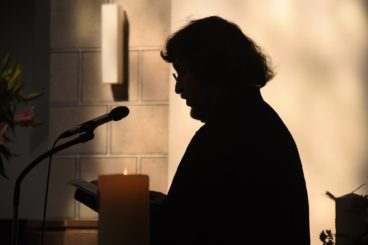
Editor’s Note: This article was originally published September 30, 2019. We’re re-posting in honor of Mental Health Awareness Month.
My eyes squinted shut as the nurse wheeled me out the front doors of the psych ward. It was the first time I’d seen the sun in more than a week.
“Good luck, Mr. Austin. Take care of yourself,” she said, patting my shoulder.“Promise you’ll never stop telling the truth or asking for help. You’re one of the lucky ones.”
The nurse’s compassion made me feel a little more human, but “lucky”? How could anyone look at my situation and call me lucky? The only thing worse would have been calling me “blessed.”
I was a pastor when I nearly died by suicide. If you had to read that twice, I get it. It’s the kind of sentence that isn’t ever supposed to be true. My life had reached a point where I felt there was no hope, so I tried to die in a hotel room, wanting to never wake up.
I’d served the church for nearly ten years. Every Sunday, I showed up for services while suffering in silence with mental illness. Pastors are expected to plan and preach perfect services every Sunday, all while counseling congregants, answering middle-of-the-night phone calls from the hospital, arbitrating church disputes, traveling for weddings and funerals, and being in the building every time the church is open. It’s a caring profession that can prevent practitioners from caring for themselves.
Every Sunday, I showed up for services while suffering in silence with mental illness.
I grew up in a fundamentalist culture that demanded outward performance over genuine faith. Fear-based theology had me paralyzed. I couldn’t imagine confessing the anxiety which whispered white noise in my ears. What would my fellow Christians think about the black dog of depression often barking louder than the voice of God?
Christians claim to want pastors who are authentic and real, but the moment a pastor shows signs of weakness or reveals their humanity, we recoil. Our shepherds should have all the answers, we think. We expect our pastors to be little gods—an unhealthy and unfair expectation.
2,000 people worldwide will die by suicide today. No one is immune. But when a well-known pastor dies by suicide, we feel like they should have done better. Like they owed us more.
Our click-bait culture is good at publicizing tragedy. We may allow grieving if it’s limited to a week or two. But we’re lousy at sitting with people in the midst of the despair that slowly builds and leads some to die at their own hand.
Of course, we weep when this happens, but did we give our pastors permission to share how they were feeling? Do we fear a vulnerable pastor will cause church attendance to drop or the offering plate to dry up? Do we care more about rumors spreading than we do about the health of our leadership? I understand that talking about mental illness from the pulpit may open a big can of worms, but we can’t heal from what we aren’t willing to address.
If we suspected our beloved pastor was having a heart attack or exhibiting symptoms of a stroke, we’d be the first to rush them to the hospital. Because mental illness is mostly invisible and highly stigmatized, we don’t respond with the same urgency. This must change.
One in five people in your church is living with mental illness. When a pastor has the courage to share what life is like at the intersection of faith and mental illness, it opens the door for other members of the congregation to say these things out loud. The darkness we preach against can only fully be fought in the light of honest community.
When pastors reach out to an inner circle of friends at their lowest moments only to get “I’m praying for you” as a response, it’s not enough. We have to follow suicide prevention protocol and get them immediate help. This isn’t something we can dismiss as believers. We must act in the moment.
For those of us living with mental illness, the church can sometimes feel cranky and unkind. We often hide in the shadows for fear of being thought of as less than a real Christian. Yet many of us continue to white-knuckle the back of a pew Sunday after Sunday, wishing we could be accepted just as we are. Hoping maybe someday it will be okay to hurt—even in a sacred space.
We don’t expect the psych ward to immediately “fix” mental illness any more than we think church attendance will magically remove all of our doubts or struggles. Yet respecting the process and cultivating a community where genuine love rules the day has the power to shatter our shame.
So what can we do?
If you’re a pastor drowning under the weight of mental health concerns, particularly suicidal ideation, here’s my advice: Get out from behind the pulpit and rest for as long as it takes. Even Jesus felt overwhelmed by the crowds and drew away to a quiet place to rest and recover.
Listen to his words here:
“Are you tired? Worn out? Burned out on religion? Come to me. Get away with me and you’ll recover your life. I’ll show you how to take a real rest. Walk with me and work with me—watch how I do it. Learn the unforced rhythms of grace. I won’t lay anything heavy or ill-fitting on you. Keep company with me and you’ll learn to live freely and lightly.” Matthew 11:28-30, The Message
Sabbath is rarely practiced by pastors today. A sabbatical for paid clergy is almost unheard of. But if you want to see your mental and spiritual health restored, you’ve got to take a break. Consider blocking off a day each week away from your phone and email, or even taking three months away from the pressure of ministry to get grounded. These practices can save your life. If you’re tempted to push back against this, I’d like to emphasize that congregational health begins with individual health. And this includes pastors.
If you’re hurting and tempted to think things will never get better, it’s simply not true. In fairness, it doesn’t usually happen at the snapping of Christ’s cosmic fingers. Healing requires lots of honesty, self-care, a safe community, and hard work with mental health professionals, but it can get better. It truly can.
I have been changed forever because of a suicide attempt, but I won’t allow that moment to shame me. I have much more life to live. I will be more kind, gracious, and compassionate. I choose to speak truth to the heaviness of guilt. And I still believe in the God who makes all things new. If I’ve learned anything since recovering from a suicide attempt, it’s that the God present in the bread and wine is also in the anxiety medication and the therapist’s couch.
If I’ve learned anything since recovering from a suicide attempt, it’s that the God present in the bread and wine is also in the anxiety medication and the therapist’s couch.
Are you a church person who doesn’t understand mental illness? It’s okay. Just remind those of us who are battling mental illness that grace is abundant, especially when life feels overwhelming and dark. Tell us we are worth fighting for and then fight for us. Remind us that God loves us, exactly as we are, and that perfection isn’t a prerequisite to serving God. If you really love your pastor, urge them to be transparent. Encourage conversation about mental health. And think about what you’ll do if you find out they struggle.
And please, don’t try to frame suicide as a spiritual failing. Mental illness is exactly that: an illness. You (hopefully) wouldn’t judge a cancer patient’s faith, or blame your pastor’s high cholesterol on their faulty prayer life. It’s no different with mental illness. You can’t just “choose joy” or “have more faith” when it comes to a disease of despair. When you’re not sure what to say or how to respond, always err on the side of compassion. And for the love of God, don’t quote us another cherry-picked Scripture. We’ve already heard them all.
No one wants to hear about a pastor struggling with suicidal ideation. It feels too weird. It’s not supposed to happen. But it is happening, both in the pews and the pulpit. As Christians, we must embrace honesty and provide support for our clergy if we have any hope of saving lives.
Yes, it’s hard to think about what might happen if your congregation finds out your pastor suffers from anxiety or depression. But what will it do to the church community if they die? What will it do to you, reading these words right now? What will it do to the heart of God?
We can be brave, walking together through darkness. We can and we must.
 Steve Austin came to know God best while recovering from a suicide attempt. He is the author of From Pastor to a Psych Ward, available as a free download on his website, Catching Your Breath. Steve lives in Birmingham, Alabama, with his wife Lindsey and their two children.
Steve Austin came to know God best while recovering from a suicide attempt. He is the author of From Pastor to a Psych Ward, available as a free download on his website, Catching Your Breath. Steve lives in Birmingham, Alabama, with his wife Lindsey and their two children.


